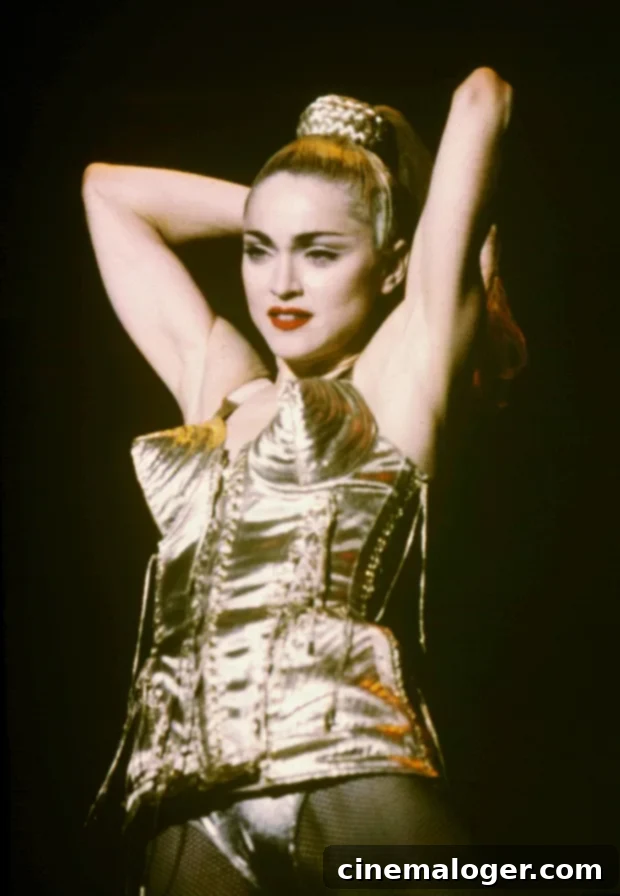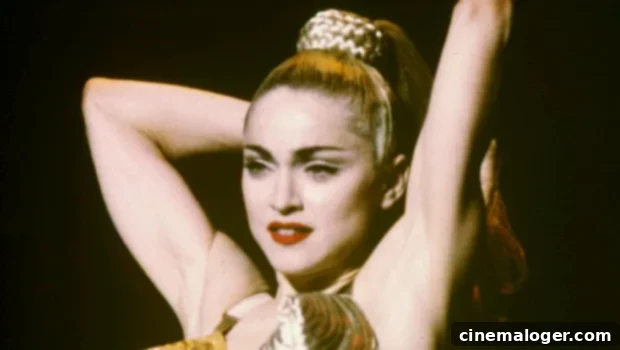Madonna’s Enduring Legacy: How ‘Erotica’ and ‘Sex’ Paved the Way for Modern Female Empowerment
In 1992, the pop icon Madonna unleashed a cultural firestorm with the simultaneous release of her album Erotica and its controversial companion, the coffee table book S.E.X. Thirty years later, Madonna, now 64, reflects on this pivotal moment in her career, asserting that her audacious acts of self-expression paved the way for contemporary celebrities like Kim Kardashian, Cardi B, and Miley Cyrus to publicly embrace their sexuality without the same level of condemnation she faced. This reflection came via her Instagram story, where she detailed the content of her groundbreaking book and the subsequent backlash.
“30 years ago I published a book called S.E.X. In addition to photos of me naked there were photos of Men kissing Men, Woman kissing Woman and Me kissing everyone. I also wrote about my sexual fantasies and shared my point of view about sexuality in an ironic way,” Madonna penned, encapsulating the radical nature of her project. The book, a collaboration with photographer Steven Meisel, was a limited edition piece bound in aluminum, designed to challenge societal norms regarding sex, gender, and celebrity. It wasn’t merely about nudity; it was a curated artistic statement that explored themes of identity, desire, and sexual fluidity, all delivered with Madonna’s signature blend of provocation and intellect. Its release just one day after her equally boundary-pushing album Erotica created an unprecedented multimedia experience that sent shockwaves across the globe.
madonna gently setting the record straight for the kids who think she just makes silly tiktoks pic.twitter.com/dzu3lsYf5z
— matt (@mattxiv) October 22, 2022
The cultural landscape of 1992 was notably different from today’s. While Madonna had already established herself as an artist who consistently pushed boundaries, the *Erotica* era marked a significant escalation. The album itself delved into themes of sadomasochism, forbidden desires, and sexual identity with unapologetic frankness. Coupled with the explicit imagery in the *S.E.X.* book, Madonna positioned herself at the epicenter of a fierce debate about art, censorship, and female agency. For the Bay City, Michigan native, the subsequent years were fraught with public scrutiny and harsh judgment. “I spent the next few years being interviewed by narrow minded people who tried to shame me for empowering myself as a Woman,” she continued in her Instagram story. “I was called a whore, a witch, a heretic and the devil.” This intense vilification highlighted the double standards prevalent in society, where male artists were often lauded for similar expressions of sexuality, while women were condemned.
This wasn’t Madonna’s first encounter with censorship. Just two years prior, in 1990, the black-and-white Jean-Baptiste Mondino directed music video for “Justify My Love”—which featured Lenny Kravitz—had been banned from MTV due to its explicit imagery, including depictions of S&M and same-sex kissing. This ban only served to amplify Madonna’s message of challenging conventions and underscored her commitment to artistic freedom. The controversy surrounding “Justify My Love” effectively set the stage for the even more explosive reception of *Erotica* and *S.E.X.*, proving that Madonna was unwavering in her mission to dismantle taboos and provoke thought.

Drawing a direct line from her past struggles to the present-day landscape of pop culture, Madonna confidently declared her influence on today’s stars. “Now Cardi B can sing about her ‘WAP.’ Kim Kardashian can grace the cover of any magazine with her naked a– and Miley Cyrus can come in like a wrecking ball. You’re welcome b——- …….,” she concluded her statement with a cloud emoji, a clear nod to her pioneering spirit. Indeed, the explicit nature of Cardi B and Megan Thee Stallion’s “WAP”—an acronym for “wet a– p—-,” released in August 2020—caused a similar, though less intense, moral panic, yet it was embraced by a wider audience and became a massive commercial success. Likewise, Kim Kardashian has become synonymous with body positivity and audacious fashion choices, famously appearing on the cover of Interviewmagazine with her bare derrière, a move that, while still attention-grabbing, rarely elicits the same level of outrage that Madonna’s nudity once did. And Miley Cyrus’s “Wrecking Ball” video from 2013, featuring her naked on a wrecking ball, was considered provocative but also a powerful expression of vulnerability and heartbreak, far from being banned outright.
Madonna’s point highlights a crucial evolution in how female artists are permitted to express their sexuality. While backlash still exists, the outright shaming and demonization that Madonna endured have lessened, allowing contemporary artists more freedom to explore and celebrate their bodies and desires. This shift is a testament to the persistent efforts of trailblazers like Madonna, who risked their careers to challenge entrenched puritanical views.

Following her Instagram message, the “Vogue” singer re-shared a clip from a 1992 interview, offering further insight into her artistic motivations behind the *S.E.X.* book, including her controversial decision to publish nude images of herself and others. In the clip, the interviewer candidly admitted his apprehension, stating he’d “never seen the likes of” anything like the book. Madonna, ever quick-witted, challenged his stance: “You’ve never read Playboy magazine, or Penthouse, or anything like that?” The interviewer’s response—“it was different with you. The picture of you astride the mirror, masturbating – I thought that was horrible. It just strikes me as horrible”—underscored the deeply ingrained societal discomfort with female sexual agency, especially when openly displayed by a powerful woman. This exchange perfectly illustrates the double standard Madonna was fighting against: society’s acceptance of male-produced pornography versus its condemnation of a woman’s artistic exploration of her own sexuality.
However, Madonna’s bold claim did not land entirely smoothly with all her alleged beneficiaries. Cardi B, in particular, took offense to Madonna’s Instagram post, deeming it “disrespectful” in a series of tweets to her fans. “I literally payed this woman homage so many times cause I grew up listening to her …she can make her point without putting clown emojis and getting slick out the mouth ..These icons really become disappointments once u make it in the industry that’s why I keep to myself,” Cardi B wrote on Oct. 23, expressing her frustration. She further defended herself against fans who took Madonna’s side, stating, “Y’all are ridiculous…I don’t give a f— who it is nobody is going to disrespect me specially unprovoked are you dumb?” This momentary friction highlighted the complex dynamics between generations of artists, where appreciation for a predecessor’s groundwork can sometimes clash with a desire for direct acknowledgement and mutual respect in the present.
Love you ❤️ https://t.co/LFUwHSARco
— Cardi B (@iamcardib) October 23, 2022
Thankfully, this public spat was short-lived. Hollywood Unlocked’sJason Lee stepped in to mediate, successfully arranging a phone call between the two powerhouse artists to clear the air. The reconciliation was swift and public, with Cardi B tweeting just hours later on Oct. 23, “I talked to Madonna …It was beautiful….Have a great day and drive safely yallll.” Madonna reciprocated the sentiment, replying, “I love you @iamcardib !! Always have and always will.” This swift resolution underscored a mutual respect that ultimately transcends any minor miscommunication, showcasing the potential for dialogue and understanding between different generations of female artists.
Madonna’s reflection on the 30th anniversary of *Erotica* and *S.E.X.* is more than just a look back at a controversial moment; it’s a powerful assertion of her enduring legacy as a pioneer. Her brave and often solitary fight against censorship and societal judgment paved an undeniable path for the sexual liberation and bold self-expression seen in today’s entertainment industry. By relentlessly challenging the status quo, Madonna not only created art but also reshaped cultural norms, making it safer for subsequent generations of women to own their bodies, voices, and desires without fear of being entirely “shamed as a woman.” Her impact continues to reverberate, reminding us that true artistry often requires courage, controversy, and an unyielding commitment to pushing boundaries.
